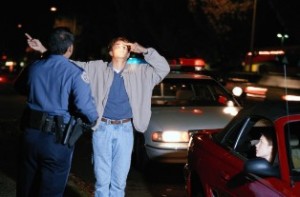When a person is pulled over under the suspicion of driving under the influence of alcohol (DUI) in Pennsylvania, there is a series of field sobriety tests conducted by a police officer to establish probable cause to issue a valid arrest.

 Generally, there is no requirement in Pennsylvania that requires the police to perform field sobriety test; however, it is used to establish probable cause to arrest an individual suspected of a DUI. Here are the types of field sobriety tests and how they are used as evidence against individuals in court.
Generally, there is no requirement in Pennsylvania that requires the police to perform field sobriety test; however, it is used to establish probable cause to arrest an individual suspected of a DUI. Here are the types of field sobriety tests and how they are used as evidence against individuals in court.
The Field Sobriety Tests
The field sobriety test measures your physical balance and coordination. The National Highway Traffic Safety Administration (NHTSA) recognizes three standardized field sobriety tests as reliable indicators of intoxication: the one-legged stand, walk and turn, and the horizontal gaze nystagmus (HGN) test.
1. The One-Legged Stand Test
The one-leg stand test examines your balance and coordination. The test requires you to stand with one foot approximately six inches off the ground and count by the thousands until told to put your foot down. If the police officer determines that you have failed this test, he or she may arrest you and charge with a DUI.
Nevertheless, the evidence of this test does not prove that you are guilty of being intoxicated. The police will still have to take a breathalyzer or a chemical test to determine your blood-alcohol content (BAC) to officially charge you with a DUI. This additional information may be used as evidence against you in court.
2. The Walk and Turn Test
The walk and turn test requires you to take nine steps, heel-to-toe, along a straight line. After taking all nine steps, you must turn on one foot and return in the same manner in the opposite direction. The police officer will look for the following characteristics to determine if you are intoxicated: 1) failure to touch heel-to-toe; 2) failure to balance; and / or 3) taking the incorrect number of steps. If you do not successfully complete this test, you may be arrested and charged with DUI. As mentioned above, the police will likely have to perform a breathalyzer or blood test to determine your official BAC level.
3. The Horizontal Gaze Nystagmus (HGN) Test
The HGN test measures the involuntary jerking of the eyeball which occurs naturally as the eyes gazes to the side. Under normal circumstances, the nystagmus occurs when the eyes are rotated at high peripheral angles. However, when if you are intoxicated with alcohol, nystagmus is exaggerated and may occur as lesser angles.
You may be asked to put your finger to your nose, or follow a pen or light. If you are under the influence of alcohol, you will have difficulty tracking a moving object. If your eye does not follow the object smoothly, or jerks at maximum deviation, the police officer will take this as a strong sign on intoxication and possibly arrest you.
Evidence from the HGN test may not be admissible in Pennsylvania courts. The courts have routinely held that the Commonwealth’s evidence was insufficient to show that the HGN test was generally accepted in the scientific community as proof that a person is intoxicated. See Commonwealth v. Apollo, 412 Pa. Super 453, 603 A. 2d 023 (1992).
The test is primarily used to allow a police officer to probe for more information to issue a valid arrest.
Note, a person can refuse to take the field sobriety test; however, the prosecutor may use this refusal to show a consciousness of guilt. An experienced DUI attorney can help reduce the DUI charges, or get the charges dropped if the evidence against your arrest is shown to be inconclusive. Contact the Law Offices of Basil D. Beck III at 610-239-8870 for more information on how to challenge a field sobriety test for under a DUI offense.
Sources

